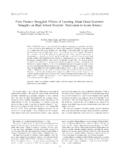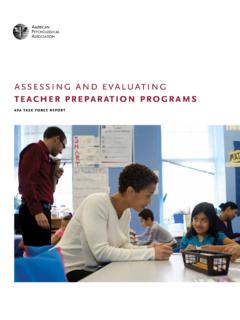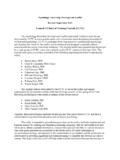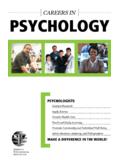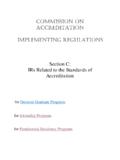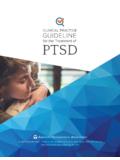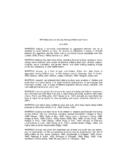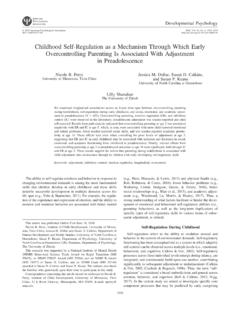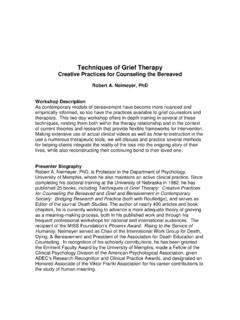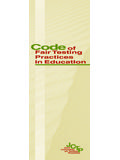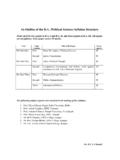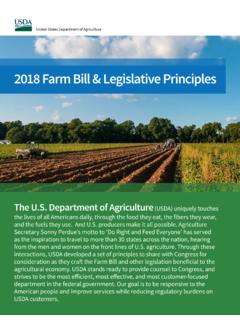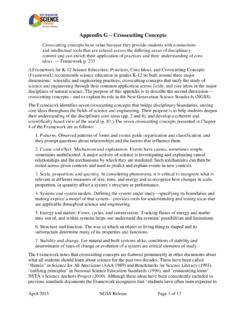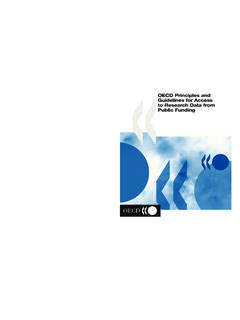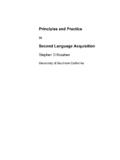Transcription of re TEACHING AND LEARNING
1 TOP 20 principles FROM. PSYCHOLOGY FOR PreK 12. TEACHING AND LEARNING . Coalition for Psychology in Schools and Education Top 20 principles From Psychology for PreK 12 TEACHING and LEARNING Coalition for Psychology Thanks to the following members and former in Schools and Education members of the Coalition for Psychology in Schools and Education and supporters for their contributions Contributing Authors as reviewers: Joan Lucariello, PhD (Chair). Sandra Graham, PhD Larry Alferink, PhD James Mahalik, PhD. Bonnie Nastasi, PhD Eric Anderman, PhD Rob McEntarffer, PhD. Carol Dwyer, PhD Joshua Aronson, PhD John Murray, PhD. Russ Skiba, PhD Cynthia Belar, PhD Sam Ortiz, PhD. Jonathan Plucker, PhD Hardin Coleman, PhD Isaac Prilleltensky, PhD. Mary Pitoniak, PhD Jane Conoley, PhD Yadira Sanchez, PsyD. Mary Brabeck, PhD Tim Curby, PhD Peter Sheras, PhD. Darlene DeMarie, PhD Robyn Hess, PhD Gary Stoner, PhD. Steven Pritzker, PhD Randy Kamphaus, PhD Adam Winsler, PhD.
2 Jason Young, PhD. APA Staff Liaison Rena Subotnik, PhD. Geesoo Maie Lee Printed copies are available from: Suggested bibliographic reference: Center for Psychology in Schools and Education American Psychological Association, Coalition for Psychology in Education Directorate Schools and Education. (2015). Top 20 principles from psychol- American Psychological Association ogy for preK 12 TEACHING and LEARNING . Retrieved from http://. 750 First Street, NE Washington, DC 20002-4242. Copyright 2015 by the American Psychological Association. 202-336-5923. This material may be reproduced and distributed without Email: permission provided that acknowledgment is given to the American Psychological Association. This material may not A copy of this report is available online at be reprinted, translated, or distributed electronically without prior permission in writing from the publisher. For permis- sion, contact APA, Rights and Permissions, 750 First Street, NE, Washington, DC 20002-4242.
3 APA reports synthesize current psychological knowledge in a given area and may offer recommendations for future action. They do not constitute APA policy nor commit APA to the activities described therein. This particular report originated with the Coalition for Psychology in Schools and Education, an APA-sponsored group of psychologists representing APA. divisions and affiliated groups. ii Contents Top 20 principles From Psychology for PreK 12 TEACHING and 1. 3. 4. Top 20 6. How Do Students Think and Learn? principles 1 6. What Motivates Students? principles 9 16. Why Are Social Context, Interpersonal Relationships, and Emotional Well-Being Important to Student LEARNING ? principles 13 21. How Can the Classroom Best Be Managed? principles 16 25. How to Assess Student Progress? principles 18 Top 20 principles From Psychology for PreK 12 TEACHING and LEARNING Principle 1 Students'. beliefs or perceptions about Principle 12 S. etting goals that are short term intelligence and ability affect their cognitive (proximal), specific, and moderately functioning and LEARNING .
4 Challenging enhances motivation more than establishing goals that are long term Principle 2 W. hat students already know affects their (distal), general, and overly challenging. LEARNING . Principle 13 L earning is situated within multiple social Principle 3 S. tudents' cognitive development and contexts. LEARNING are not limited by general stages of development. Principle 14 I nterpersonal relationships and commu- nication are critical to both the TEACHING . Principle 4 LEARNING is based on context, so generalizing LEARNING process and the social-emotional LEARNING to new contexts is not spontaneous development of students. but instead needs to be facilitated. Principle 15 E. motional well-being influences Principle 5 A. cquiring long-term knowledge and skill is educational performance, LEARNING , largely dependent on practice. and development. Principle 6 C. lear, explanatory, and timely feedback to Principle 16 E. xpectations for classroom conduct and students is important for LEARNING .
5 Social interaction are learned and can be taught using proven principles of behavior Principle 7 S. tudents' self-regulation assists LEARNING , and effective classroom instruction. and self-regulatory skills can be taught. Principle 17 E. ffective classroom management Principle 8 Student creativity can be fostered. is based on (a) setting and communicating high expectations, (b) consistently nurtur- Principle 9 S. tudents tend to enjoy LEARNING and perform ing positive relationships, and (c) providing better when they are more intrinsically than a high level of student support. extrinsically motivated to achieve. Principle 18 F. ormative and summative assessments Principle 10 Students persist in the face of challenging are both important and useful but require tasks and process information more deeply different approaches and interpretations. when they adopt mastery goals rather than performance goals. Principle 19 S. tudents' skills, knowledge, and abilities are best measured with assessment Principle 11 Teachers' expectations about their processes grounded in psychological students affect students' opportunities science with well-defined standards for to learn, their motivation, and their quality and fairness.
6 LEARNING outcomes. Principle 20 M. aking sense of assessment data depends on clear, appropriate, and fair interpretation. Introduction Psychological science has much to contribute to enhancing TEACHING and learn- ing in the classroom. TEACHING and LEARNING are intricately linked to social and behavioral factors of human development, including cognition, motivation, social interaction, and communication. Psychological science can also provide key insights on effective instruction, classroom environments that promote LEARNING , and appropriate use of assessment, including data, tests, and mea- surement, as well as research methods that inform practice. We present here the most important principles from psychology the Top 20 that would be of greatest use in the context of preK 12 classroom TEACHING and LEARNING , as well as the implications of each as applied to classroom practice. Each principle is named and described, relevant supporting literature is provided, and its rele- vance for the classroom is discussed.
7 This work of identifying and translating psycholog- in K 12 schools and in colleges and universities in ical principles for use by preK 12 practitioners was education, liberal arts, and science divisions. Some conducted by a coalition of psychologists, known as members are in independent practice. All hold exper- the Coalition for Psychology in Schools and tise in psychology's application to early childhood, Education, that is supported by the American elementary, secondary, or special education. Psychological Association (APA). The coalition is an ideal group for translating psychological science This coalition specifically, and APA gener- for classroom use because its members collective- ally, has been putting psychological science ly represent a wide spectrum of subdisciplines in to work for preK 12 education for over a psychology, including evaluation, measurement, and decade. There are many modules and white papers statistics; developmental psychology; personality for teachers on the APA website (http://www.)
8 And social psychology; the psychology of aesthetics, ). The Top 20 project creativity, and the arts; consulting psychology; edu- was modeled after APA's earlier effort of identifying cational psychology; school psychology; counseling Learner-Centered Psychological principles (1997). psychology; community psychology; psychology of This initiative updates and broadens those principles . women; media psychology and technology; group psychology and group psychotherapy; psychological study of men and masculinity; and clinical child and adolescent psychology. Also involved in the coalition are psychologists rep- resenting communities of educators and scientists, as well as specialists in ethnic minority affairs; testing and assessment; teachers of psychology in secondary schools; children, youth, and families; and psycholo- gy honor societies. Coalition members are employed 3. Methodology The method to derive the Top 20 principles was as follows.
9 The coalition, operating in the mode of a National Institutes of Health consensus panel, engaged in a series of activities. First, each member was asked to identify two constructs, or kernels (Embry & Biglan, 2008), from psychology thought to be most essential for facilitating successful classroom TEACHING and LEARNING . This process led to the identification of approximately 45 kernels/ principles . Next, steps were taken to categorize, validate, and To identify the most important of the 45 principles /. consolidate these principles . The first step was to kernels, we used a modified Delphi process (modeled cluster the 45 principles according to key domains of after the Institute of Medicine's report Improving classroom application ( , How do students think Medical Education: Enhancing the Behavioral and and learn?). This was conducted in an iterative process Social Science Content of Medical School Curricula). across several meetings of the coalition.
10 Using a scale system, four coalition members rated each of the principles and assigned each a high, medi- Second, a validation procedure for the 45 principles um, or low priority score (1 3). Mean scores for each was undertaken. Several national blueprint publi- item were calculated. On the basis of the mean scores, cations related to TEACHING were analyzed to assess low-priority principles were discarded, leaving 22. whether each of these principles also had been identi- principles . These were then analyzed for their relation fied by the broader community of educators as critical to each other and were synthesized into the final 20. to teacher practice. Cross-checking analyses were con- presented ducted on APA's standards for high school curriculum in psychology; the PRAXIS principles of LEARNING and These Top 20 were then placed into five areas of psy- TEACHING examination from the Educational Testing chological functioning. The first eight principles relate Service; documents from the National Council for the to cognition and LEARNING and address the question Accreditation of Teacher Education; the InTASC (In- How do students think and learn?)
